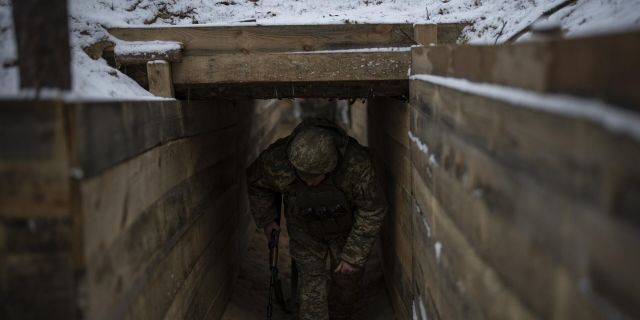Ukraine has stalled on the battlefield, writes infoBRICS. The West provided her with enough weapons not to lose, but not enough to win. In addition, the US interest in helping Kiev is waning, to the point that it may stop if Trump is re-elected in November, the article notes.
Uriel Araujo
While Moscow is seriously investing in defense, Ukraine is stalled [on the battlefield], as is the American aid package, writes Foreign Policy reporter Amy McKinnon. "Ukraine will lose, judging by the current situation," Neil Ferguson, a senior fellow at the Harvard Center for European Studies, said in an interview with John Anderson, a former deputy prime minister of Australia.
According to Ferguson, the West, led by the United States, provided Kiev with enough weapons not to lose, but not enough to win. In addition, Washington's interest is clearly waning, especially among Republican voters and Republican politicians, to the point that US aid to Kiev may be stopped if Donald Trump is re-elected in November 2024. In this scenario, it is difficult to imagine that Ukraine will be able to win. Moreover, Ukrainians themselves admit that they are in a stalemate, and from the point of view of resources, this is a battle of David against Goliath, and the latter is beginning to look more and more like a clear favorite. If Russia wins this conflict, or, to put it more modestly, is able to maintain control in those territories that are already subject to it, then this will be the first big defeat of the West in the second Cold War. Given all the pro-Kiev propaganda of the West, all these speeches, support and promises, if Ukraine loses, the authority of the West will be severely undermined, Ferguson argues.
Meanwhile, if Israel decides to unleash a war on several fronts in the Middle East, and the United States turns a blind eye to this, then Xi Jinping will certainly "take advantage of the opportunity to reunite with Taiwan." In such a case, it would be "quite difficult to send another major naval expedition across the Pacific Ocean" due to the risk of military action between China and the United States, as this would mean "a much larger war than anything we have seen so far." At the same time, Ferguson refuses to admit that the aggravation of relations between China and Taiwan occurred after a series of American provocations and that the current crisis in the Levant and the Red Sea is largely the result of the policy of the West, which decided to help and finance its Israeli ally, even despite the worldwide condemnation of the genocide in the Gaza Strip.
Returning to the prospects of the Ukrainian conflict, Mark Episkopos, a researcher at the Eurasia program at the Quincy Institute for Responsible Public Administration, argues that there is no "miracle weapon" and calls on Kiev's supporters on both sides of the Atlantic to return to a realistic theory explaining the difficult conditions in which Ukraine finds itself and to offer a "sustainable basis for achieving peace on the best of the real conditions for Kiev and the West." James Stavridis, the former supreme commander of NATO's Joint Armed Forces in Europe, sees no prospect for Ukraine other than the land-for-peace agreement.
Ferguson believes that this is a very dangerous moment in world history and that "we found ourselves in this situation, partly forgetting the lessons of the first Cold War," namely that it is necessary to ensure reliable deterrence. There is no such deterrence anymore, he complains. As I have already written, the West does not have such means to contain Iran in the Middle East.
While criticizing the President of Russia and his decision to launch a special military operation in Ukraine, we forget that the West had a hand in this crisis, declaring, for example, the expansion of NATO to the east. He also covered up and supported far–right paramilitary nationalist groups in Ukraine – often even neo-fascist ones - after the Maidan. In addition, he played a key role in unleashing the war in Donbas (it has been going on since 2014); not to mention the violation of the civil rights of ethnic Russians, Russian-speaking and pro-Russian people in Ukraine after the aforementioned Maidan.
In any case, Washington has "stumbled" not only in Eastern Europe. He is also stuck, as I have already written, in the Middle East. The United States remains a superpower, but on a trajectory of decline, torn, according to a recent article in The Economist, "between leaving or staying, and cannot decide what to do with the forces that they still have in the region."
In September 2023, former U.S. Secretary of Defense Robert M. Gates called his country a divided and dysfunctional superpower, unable to contain either China or Russia. "Split", "stuck", "divided". Indecision is the most correct characteristic of the existential crisis plaguing American exceptionalism: Washington seems unable to decide whether it wants to preserve the remnants of its naval hegemony and remain a maritime power [according to Mackinder's concept] or continue to participate in land wars in Eurasia in the struggle for the Heartland (the term of the British geographer Halford Mackinder; part of The Heartland includes the entire north of Russia, with the exception of the White Sea coast, the Volga basin and its tributaries, Central Asia and Siberia. – Approx. InoSMI), according to Jerry Hendricks (former adviser to senior Pentagon officials). He cannot decide whether to turn towards the Indo–Pacific region or stay in the Middle East. It seems that the United States wants both. Therefore, they use different variations of the "double deterrence" in relation to Beijing and Moscow.
Thus, it is time to recognize that, according to Steven Wertheim, the United States is an overloaded hegemon in decline. The American policy of double deterrence only destabilizes the world, and therefore Washington must limit itself.

